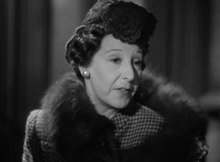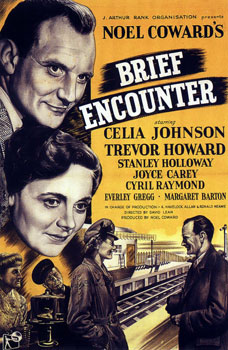
Brief Encounter is a 1945 British romantic drama film directed by David Lean from a screenplay by Noël Coward, based on his 1936 one-act play Still Life.
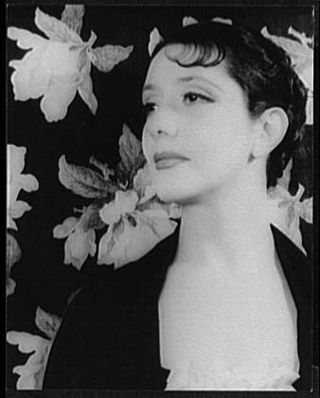
Lynn Fontanne was an English actress. After early success in supporting roles in the West End, she met the American actor Alfred Lunt, whom she married in 1922 and with whom she co-starred in Broadway and West End productions over the next four decades. They became known as "The Lunts", and were celebrated on both sides of the Atlantic.

Tonight at 8.30 is a cycle of ten one-act plays by Noël Coward, presented in London in 1936 and in New York in 1936–1937, with the author and Gertrude Lawrence in the leading roles. The plays are mostly comedies, but three, The Astonished Heart, Shadow Play and Still Life, are serious. Four of the comedies include songs, with words and music by Coward.

Virginia Lilian Emmeline Compton-Mackenzie,, known professionally as Fay Compton, was an English actress. She appeared in several films, and made many broadcasts, but was best known for her stage performances. She was known for her versatility, and appeared in Shakespeare, drawing room comedy, pantomime, modern drama, and classics such as Ibsen and Chekhov. In addition to performing in Britain, Compton appeared several times in the US, and toured Australia and New Zealand in a variety of stage plays.

Evelyn Laye was an English actress and singer.

Joyce Carey, OBE was an English actress, best known for her long professional and personal relationship with Noël Coward. Her stage career lasted from 1916 until 1987, and she was performing on television in her 90s. Although never a star, she was a familiar face both on stage and screen. In addition to light comedy, she had a large repertory of Shakespearean roles.
Carolyn Jane Onslow How is an English actress with a range of television, film, and stage credits. She is best known for her role as Jan Hammond, the mistress of Den Watts in EastEnders. She appeared in the programme regularly from 1986 to 1987 and also made brief return appearances in 2002 and 2003, the latter leading up to Den's return to the show.
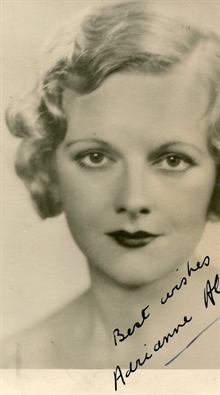
Adrianne Allen was an English stage actress.

Sir Noël Peirce Coward was an English playwright, composer, director, actor, and singer, known for his wit, flamboyance, and what Time magazine called "a sense of personal style, a combination of cheek and chic, pose and poise".

Red Peppers, described as "an interlude with music", is a short comic play in two scenes by Noël Coward. It is one of ten short plays that make up Tonight at 8.30, a cycle written to be performed in groups of three plays across three evenings. The original production, starring Coward and Gertrude Lawrence played in a pre-London tour, and then the West End, and finally New York, in 1935–1937. Red Peppers has been revived periodically and has been adapted for the cinema and television.
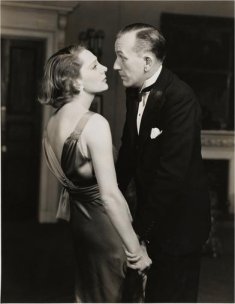
The Astonished Heart, described by the author as "a tragedy in six scenes", is a short play by Noël Coward, one of ten that make up Tonight at 8.30, a cycle written to be performed across three evenings. One-act plays were unfashionable in the 1920s and 30s, but Coward was fond of the genre and conceived the idea of a set of short pieces to be played across several evenings. The actress most closely associated with him was Gertrude Lawrence, and he wrote the plays as vehicles for them both.

Hands Across the Sea, described by the author as "a comedy of bad manners", is a one-act play by Noël Coward, one of ten that make up Tonight at 8.30, a cycle written to be performed across three evenings. One-act plays were unfashionable in the 1920s and 30s, but Coward was fond of the genre and conceived the idea of a set of short pieces to be played across several evenings. The actress most closely associated with him was Gertrude Lawrence, and he wrote the plays as vehicles for them both.
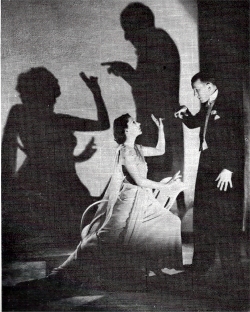
Shadow Play, described by the author as "a musical fantasy", is a one-act play by Noël Coward, one of ten that make up Tonight at 8.30, a cycle written to be performed across three evenings. Short plays were unfashionable in the 1920s and 30s, but Coward was fond of the genre and conceived the idea of a set of brief pieces to be played across several evenings. The actress most closely associated with him was Gertrude Lawrence, and he wrote the ten plays as vehicles for them both.
Star Chamber is a one-act play by Noël Coward, one of ten that make up Tonight at 8.30, a cycle written to be performed in alternating groups of three plays, across three evenings. In the introduction to a published edition of the plays, Coward wrote, "A short play, having a great advantage over a long one in that it can sustain a mood without technical creaking or over padding, deserves a better fate, and if, by careful writing, acting and producing I can do a little towards reinstating it in its rightful pride, I shall have achieved one of my more sentimental ambitions."

Still Life is a short play in five scenes by Noël Coward, one of ten plays that make up Tonight at 8.30, a cycle written to be performed across three evenings. One-act plays were unfashionable in the 1920s and 30s, but Coward was fond of the genre and conceived the idea of a set of short pieces to be played across several evenings. The actress most closely associated with him was Gertrude Lawrence, and he wrote the plays as vehicles for them both.

Family Album, described as "a Victorian comedy with music", is a short comic play in one scene by Noël Coward. It is one of ten short plays that make up Tonight at 8.30, a cycle written to be performed in groups of three plays across three evenings. The original production, starring Coward and Gertrude Lawrence played in a pre-London tour, and then the West End, and finally New York, in 1935–1937. Family Album has been revived periodically and has been adapted for television.

Easy Virtue is a three-act play by Noël Coward, written in 1924 when he was 25 years old. The play depicts the conflict that arises within a conventional upper-middle-class household when the only son of the family marries a glamorous divorcée.
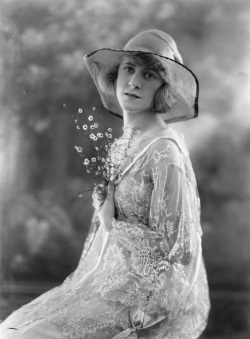
Moya Nugent was a British actress and singer. She made a few broadcasts and three silent films but was chiefly known as a stage performer, and was particularly associated with the works of Noël Coward, appearing in twelve of his plays and two of his revues. Before that, she appeared early in her career in Peter Pan, and was cast in other children's plays and pantomimes. She was in the West End casts of revues by Cole Porter and others, and in musical comedies such as Lilac Time.
This is a list of works and appearances by the English playwright, actor, singer and songwriter Noël Coward.

Jennifer Gray was a British actress, frequently seen in the West End and on tour between 1934 and 1954. She made only two cinema films, but was often seen on BBC television in the late 1940s. Among the roles she created onstage were Daphne Stillington in Noël Coward's Present Laughter and Queenie Gibbons in his This Happy Breed, which premiered on successive nights in September 1942.
